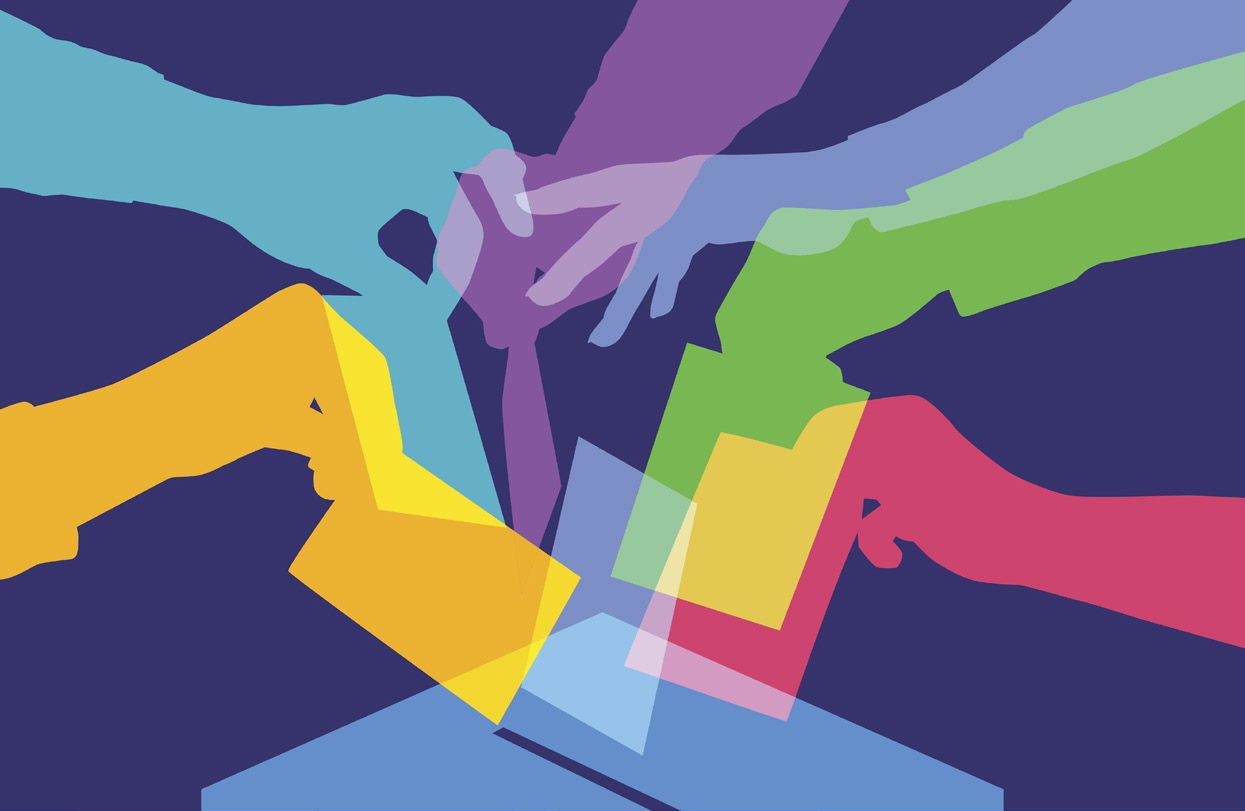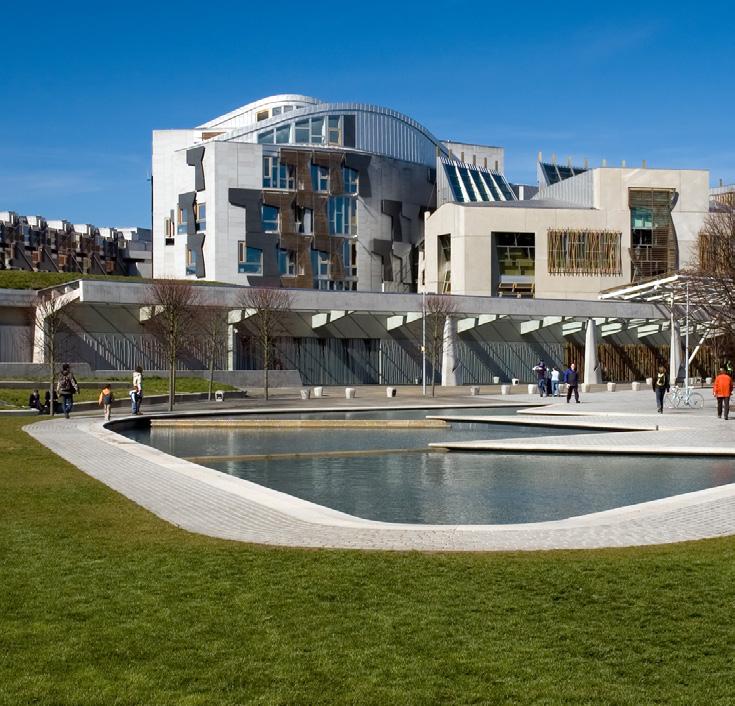COVER
The privilege of democracy
Thomas Baldwin explains why churches have a key role to play in this month’s elections to the Scottish Parliament.

Photo: iStock
ANOTHER May, another election. On Thursday May 6, Scotland will go to the polls to elect their MSPs for the next five years. By the time you read this, many will have already voted by post.
With a second independence referendum potentially round the corner should the Scottish National Party (SNP) form the next government, the stakes are high – but, while many people will be excited by the possibilities, we could also be forgiven if we were experiencing democracy fatigue.
This will be the ninth time many of us have taken part in a UK or Scottish national vote since 2010 – four UK general elections, independence and Brexit referendums, and this will be the third Scottish Parliamentary election. There have also been at least two rounds of local government elections. A sense of déjà vu while your pencil hovers over the ballot paper would be understandable.
But, with events elsewhere in the world from the US to Myanmar reminding us how fragile and precious democracy is, it is perhaps worth remembering how privileged we are to have this opportunity. Indeed, according to the Economist Intelligence Unit’s Democracy Index for 2020, less than half the world’s people live in a democracy, and only 23 countries – accounting for 8.4% of the global population – qualify as a ‘full democracy’.
David Bradwell, the Scottish Churches Parliamentary Officer, says that for a Christian voting should be part of the Gospel imperative to love our neighbour. “When we vote, we have the power to change not only our lives but the lives of those who live around us,” he says. “We have the chance to think about which candidate has the most integrity or will best serve the common good; we can think and pray about the issues and policies from the different parties and ask: how will my vote show love to my neighbour? If we care about the world, and those who live around us, then participation in democratic activities is an important part of our commitment to each other.
“In January we saw in Washington DC how fragile democracy can be, how ignorance and fear led to violence as part of the transfer of power even in the United States. Having Christians who are candidates, campaigners, voters and citizens holding politicians to account is a witness to the love and teaching of Jesus Christ in a world and society that needs healing, reconciliation and a recommitment to serve those who are struggling against poverty and injustice, and to protect the integrity of the created world.”
The Church of Scotland has never been good at following the old instruction to never mix religion and politics. While the Church has traditionally stayed out of party politics, each year’s General Assembly sees a raft of motions agreed on all sorts of issues, and in between the Church keeps up a steady stream of comment. This year alone there have been official statements on foreign policy, nuclear weapons, the coup in Myanmar and the COP26 climate conference.
The Moderator of the General Assembly, the Rt Rev Dr Martin Fair, met with leaders of Scotland’s politicial parties in February and March, with the conversations particularly focussing on Scotland’s poor record on drugs and mental health. He said at the time: “Some people think that religion and politics don’t mix and should be kept separate but this is not a view that I share.
“The Church cares about people and everyone is affected by every single decision made by politicians in some way.
“We are concerned about the impact of politics in the broadest sense – we do not engage in party politics – and it is our Christian duty, following the teachings of Jesus Christ, to give a voice to the voiceless and stand up for the vulnerable and dispossessed.
“The Church of Scotland engages with governments and parliamentarians on a regular basis to discuss a wide range of topics of mutual concern and to try and find a way to work together for the common good.”
David Bradwell adds: “The Church of Scotland has a long tradition of sharing views on political matters, often these are shaped by our theological understanding of the world and by the lived experience of our congregations and the wider communities that they serve – but we are never party political.
“Our commitment to the common good (principles of dignity and respect for all human beings, solidarity, equality, reconciliation and participation) as well as practical actions (such as supporting foodbanks, welcoming refugees or delivering projects that support mental health) mean we have a good platform to be taken seriously on issues of national and political concerns.”

Photo: iStock
“We are concerned about the impact of politics in the broadest sense – we do not engage in party politics – and it is our Christian duty, following the teachings of Jesus Christ, to give a voice to the voiceless and stand up for the vulnerable and dispossessed.
The other way in which the Church and Church members can be involved is in providing access to politicians – through the ‘Meet Your MSP’ programme and organising elections hustings events.
With all this year’s election events likely to be online, the Church has worked with Cytûn – Churches Together in Wales, Quakers in Scotland, and the Joint Public Issues Team to produce updated guidance on how to hold hustings meetings.
David Bradwell says: “I’d encourage people to think about organising a meeting to allow voters to meet candidates, and to think about what difference votes can have on this election. As well as voting we encourage churches to build good relationships with their MSPs, to show pastoral support for those in public life, and to allow for communication and sharing of ideas when debates inevitably take place. We will be promoting our ‘Meet Your MSP’ programme after the election, especially where MSPs have been elected to Holyrood for the first time.”
Convener of the Church of Scotland Faith Impact Forum, the Very Rev Dr Susan Brown, said: “There is an important civic role that the Church can play in national life in helping people to participate in the democratic process.
“The scenes from the US Capitol in January should be a reminder that democracy is fragile and needs to be protected; the values of freedom, equality and transparency which we sometimes take for granted are things we should strengthen and celebrate.
“Democracy is not simply about putting an ‘x’ in a box but thinking about the role all of us can play to build positive relationships and protect and promote human dignity.”
Mary Sweetland sits on the Faith Impact Forum and is an elder of Lomond Parish Church, Balloch, which organised a hustings in the run up to the 2019 UK Parliament election.
She said: “Churches need to be at the heart of their community, listening to and engaging with local and national issues, transforming unjust structures of society and caring for creation.
“It is likely [in my church] that we will not be able to hold a face to face hustings meeting this April due to continuing Covid-19 restrictions on large gatherings.
“This advice being published is helpful, encouraging churches to work with other congregations in the constituency, to pool technical expertise and make for a bigger audience.”
The Church’s other self-appointed role in recent years has been in trying to promote a more moderate tone in political discussion, emphasising the importance of ‘disagreeing well’ with people who hold a different view to ours. This began during the 2014 independence referendum, when the Church was officially neutral but ran a series of debates held under the banner of ‘Respectful Dialogue’, as well as holding a reconciliatory service the Sunday after the vote.
With an increasingly polarised political landscape and the ever-increasing levels of misinformation and abuse in political debate online, particularly in social media, that role seems more important now than ever. “Encouraging civility in public discourse means dignity for all and a better quality of discussion,” says David Bradwell.
The Very Rev Dr John Chalmers was Moderator of the General Assembly during the 2014 referendum. He says: “Political debate these days seems to be firmly stuck in a polarising rut and many of us feel that this is deeply detrimental to the advances that we have to make on so many important fronts. Is the gulf between rich and poor going to be closed or the desperate need to address the climate crisis going to be advanced while we shout at one another from behind our soap boxes?
“I’d encourage people to think about organising a meeting to allow voters to meet candidates, and to think about what difference votes can have on this election.
“During the Independence Referendum some of us tried to model another way of exploring and expressing our differences – it was called Respectful Dialogue, in which we agreed to show respect and courtesy towards all those who were engaged in the discussions, whatever views they held. And even if we disagreed with one another we would seek to maintain our friendships and our respect for one another’s point of view.
“I hope that there will be another call to Respectful Dialogue in advance of this coming election. I will be one of those who will publicly be supporting the idea that it is in the ‘interests of a flourishing Scotland and of the Scottish Parliament that the forthcoming election campaign is conducted with civility and dignity.’ Surely that’s the kind of approach that could give way to a very different kind of political landscape.”
The guidance for congregations on holding hustings meetings, and a series of non-partisan briefing papers on current issues at play in the election, are available on the Scottish Churches Parliamentary Office website at www.scpo.scot/elections/